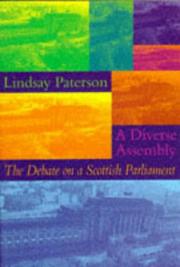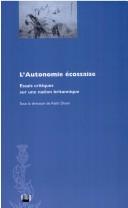| Listing 1 - 10 of 18 | << page >> |
Sort by
|
Book
ISBN: 1874640920 Year: 1997 Publisher: Argyll, Scotland Argyll Pub.
Abstract | Keywords | Export | Availability | Bookmark
 Loading...
Loading...Choose an application
- Reference Manager
- EndNote
- RefWorks (Direct export to RefWorks)
Book
ISBN: 2859392238 9782859392239 Year: 1983 Publisher: Lille: Presses universitaires de Lille,
Abstract | Keywords | Export | Availability | Bookmark
 Loading...
Loading...Choose an application
- Reference Manager
- EndNote
- RefWorks (Direct export to RefWorks)
Nationalism --- Home rule --- Scotland --- Politics and government --- Nationalism - Scotland --- Home rule - Scotland --- Scotland - Politics and government - 20th century
Book
ISBN: 9780199545957 0199545952 Year: 2009 Publisher: Oxford: Oxford university press,
Abstract | Keywords | Export | Availability | Bookmark
 Loading...
Loading...Choose an application
- Reference Manager
- EndNote
- RefWorks (Direct export to RefWorks)

ISBN: 0748610073 Year: 1998 Publisher: Edinburgh Edinburgh University press
Abstract | Keywords | Export | Availability | Bookmark
 Loading...
Loading...Choose an application
- Reference Manager
- EndNote
- RefWorks (Direct export to RefWorks)
The 1997 Scottish Referendum confirmed the wish of the Scottish people for their first Parliament in almost 300 years. In this book Paterson draws together a collection of the key arguments for and against the reinstating of a Scottish Parliament.
Home rule (Ecosse) --- Home rule (Schotland) --- Home rule (Scotland) --- Constitutional law --- Home rule --- Scotland. --- Pà̀rlamaid na h-Alba --- Scots Commission in London --- Scottish Parliament --- Scotland. Parliament --- Scotland

ISBN: 0585110018 9780585110011 0748611576 0748610073 9780748611577 9780748610075 Year: 1998 Publisher: Edinburgh Edinburgh University Press
Abstract | Keywords | Export | Availability | Bookmark
 Loading...
Loading...Choose an application
- Reference Manager
- EndNote
- RefWorks (Direct export to RefWorks)
The 1997 Scottish Referendum confirmed the wish of the Scottish people for their first Parliament in almost 300 years. In this book Paterson draws together a collection of the key arguments for and against the reinstating of a Scottish Parliament.
Constitutional law --- Home rule --- Home rule (Scotland) --- Scotland. --- Pà̀rlamaid na h-Alba --- Scots Commission in London --- Scottish Parliament --- Scotland --- Politics and government

ISBN: 2843100267 237747151X 9782843100260 Year: 2001 Volume: *5 Publisher: Grenoble: Ellug,
Abstract | Keywords | Export | Availability | Bookmark
 Loading...
Loading...Choose an application
- Reference Manager
- EndNote
- RefWorks (Direct export to RefWorks)
Home rule --- -323.17 <411> --- Rule, Home --- Autonomy --- Scotland --- Politics and government --- -Economic conditions --- -Home rule --- -Scotland --- Ecosse --- Politique et gouvernement --- 323.17 <411> --- Home rule (Scotland) --- Economic conditions --- Home rule - Scotland. --- Institutions politiques --- Ecosse (grande-bretagne) --- 1990 --- -Histoire --- Autonomie et mouvements independantistes --- 20e siecle
Book
ISBN: 9780198755517 9780198755524 019875552X Year: 2016 Publisher: Oxford: Oxford university press,
Abstract | Keywords | Export | Availability | Bookmark
 Loading...
Loading...Choose an application
- Reference Manager
- EndNote
- RefWorks (Direct export to RefWorks)
The September 2014 Scottish independence referendum was an event of profound constitutional and political significance, not only for Scotland, but for the UK as a whole. Although Scottish voters chose to remain in the UK, the experience of the referendum and the subsequent political reaction to the 'No' vote that triggered significant reforms to the devolution settlement have fundamentally altered Scotland's position within the Union. The extraordinary success of the Scottish National Party at the 2015 General Election also indicates that the territorial dimension to UK constitutional politics is more prominent than ever, destabilising key assumptions about the location and exercise of constitutional authority within the UK. The political and constitutional implications of the referendum are still unfolding, and it is by no means certain that the Union will survive. Providing a systematic and academic analysis of the referendum and its aftermath, this interdisciplinary edited collection brings together public lawyers, political scientists, economists, and historians in an effort to look both backwards to, and forwards from, the referendum. The chapters evaluate the historical events leading up to the referendum, the referendum process, and the key issues arising from the referendum debate. They also explore the implications of the referendum both for the future governance of Scotland and for the UK's territorial constitution, drawing on comparative experience in order to understand how the constitution may evolve, and how the independence debate may play out in future.
Referendum --- Home rule --- Self-determination, National --- Constitutional law --- Scotland --- Politics and government --- History --- Referendum - Scotland --- Home rule - Scotland --- Self-determination, National - Scotland --- Constitutional law - Scotland --- Royaume-Uni --- Scotland - Politics and government - 21st century --- Scotland - History - Caricatures

ISBN: 237747151X 2843100267 Year: 2001 Publisher: Grenoble ELLUG
Abstract | Keywords | Export | Availability | Bookmark
 Loading...
Loading...Choose an application
- Reference Manager
- EndNote
- RefWorks (Direct export to RefWorks)
L'Écosse est aujourd'hui à la croisée des chemins : le maintien au sein du Royaume-Uni, dont les contours institutionnels ont été sensiblement remaniés depuis l'arrivée des néo-travaillistes au pouvoir en 1997, ou l'indépendance complète qui mettrait fin à un « partenariat » avec l'Angleterre qui dure depuis 1707. Comment expliquer cette volonté d'autonomie qui est devenue la nouvelle donne de la scène politique écossaise et britannique depuis un quart de siècle ? Quels sont les rapports exacts entre les revendications autonomistes qui dépassent, et de très loin, le vote nationaliste et l'effervescence culturelle qui caractérise l'Écosse depuis les années soixante-dix ? Quelles sont les nouvelles figures de l'identité écossaise qui émergent des débats actuels ? Quelle est la réalité économique et sociale de l'Écosse contemporaine, au delà des clichés médiatiques et des mythes ? Un ensemble de spécialistes, britanniques et français, apporte, dans cet ouvrage, des éléments de réponse à ces questions. En faisant le point sur le chemin parcouru depuis « l'éclatement de la Grande-Bretagne » dont les premiers signes furent repérés par l'historien Tom Nairn, il y a un quart de siècle. L'Autonomie écossaise propose une vision nouvelle et critique de celle nation de la « périphérie » britannique.
Home rule --- Scotland --- Politics and government --- Economic conditions --- Economics --- Political history --- 20th century --- Home rule (Scotland) --- Ecosse --- Politique et gouvernement --- Institutions politiques --- Ecosse (grande-bretagne) --- Histoire --- 1990 --- -Histoire --- Autonomie et mouvements independantistes --- 20e siecle
Book
ISBN: 0191831492 0192507044 0192507052 Year: 2017 Publisher: Oxford : Oxford University Press,
Abstract | Keywords | Export | Availability | Bookmark
 Loading...
Loading...Choose an application
- Reference Manager
- EndNote
- RefWorks (Direct export to RefWorks)
On 18 September 2014, Scotland held a referendum on the question: Should Scotland be an independent country? This is a most unusual event in modern democracies and engaged the political class, civil society, and the general public to an unprecedented degree, leading to an 85 per cent turnout in the final vote. This was an occasion to debate not just the narrow constitutional issue but the future of the nation, including the economy, social welfare, defence and security, and Scotland's place in Europe and the world. 'Debating Scotland' comes from a team of researchers who observed the debates from close-up and engaged with both sides, with the media and with the public in analysing the issues, while remaining neutral on the independence question.
Self-determination, National --- Home rule --- Scotland --- Politics and government --- History --- Autonomy and independence movements. --- Home rule (Scotland) --- National self-determination --- Nationalism --- Nation-state --- Nationalities, Principle of --- Sovereignty --- Caledonia --- Scotia --- Schotland --- Sŭkʻotʻŭllandŭ --- Ecosse --- Škotska --- Great Britain --- 2000-2099
Book
ISBN: 9786612349188 128234918X 0191571229 Year: 2009 Publisher: Oxford ; New York : Oxford University Press,
Abstract | Keywords | Export | Availability | Bookmark
 Loading...
Loading...Choose an application
- Reference Manager
- EndNote
- RefWorks (Direct export to RefWorks)
After three hundred years, the Anglo-Scottish Union is in serious difficulty. This is not because of a profound cultural divide between England and Scotland but because recent decades have seen the rebuilding of Scotland as a political community while the ideology and practices of the old unionism have atrophied. Yet while Britishness is in decline, it has not been replaced by a dominant ideology of Scottish independence. Rather Scots are looking to renegotiate union to find a newplace in the Isles, in Europe, and in the world. There are few legal, constitutional or political obstacles to Scot
Home rule --- Self-determination, National --- Scotland --- Politics and government --- National self-determination --- Nationalism --- Nation-state --- Nationalities, Principle of --- Sovereignty --- Home rule (Scotland) --- Caledonia --- Scotia --- Schotland --- Sŭkʻotʻŭllandŭ --- Ecosse --- Škotska --- Great Britain
| Listing 1 - 10 of 18 | << page >> |
Sort by
|

 Search
Search Feedback
Feedback About UniCat
About UniCat  Help
Help News
News